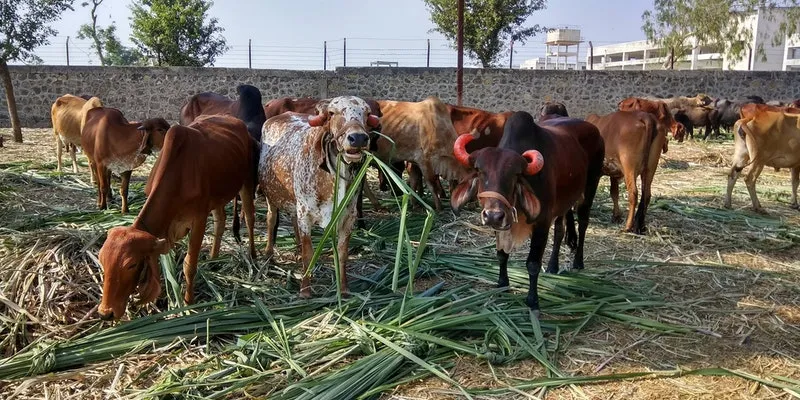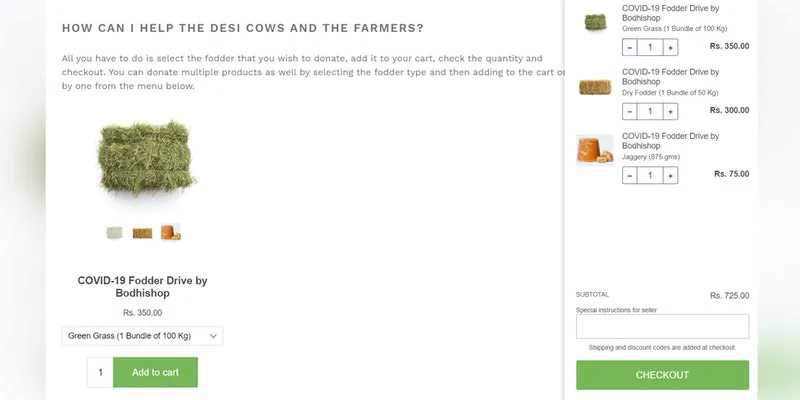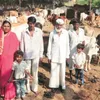Coronavirus: With lockdown affecting dairy farmers, Mumbai-based Bodhishop is ensuring cows don't suffer
Bodhishop has initiated a ‘COVID-19 Fodder Drive’ where people can directly purchase fodder for cows and help keep small dairy farms stay afloat amid the coronavirus-led lockdown.
The 21-day nationwide lockdown to curb the rising cases of coronavirus in India has crippled industries across the breadth of the country. One of them is the dairy sector.
With even dairy giants like Amul and Mother India expecting a 30 percent drop in the demand for milk due to migrants leaving the metros, it leaves little hope for small dairy farmers to survive the crisis. In a video that went viral a week after the lockdown, over 40 cans of milk were thrown away in a canal in Karnataka’s Belagavi district as the farmers were unable to sell it.
For small farmers, the sudden disappearance of demand is not just putting a question on the survival of their business but is also threatening the survival of their means – their cows. With the purse strings tightened, farmers found themselves unable to buy fodder. And cows, whether they produce milk or not, need 25kg of fodder every day.
This is where Bodhishop, a startup that delivers desi cow milk and cow by-products, stepped in to help. The Mumbai-based dairy startup has initiated a ‘COVID-19 Fodder Drive’ through which donors can directly purchase the fodder on its site, and Bodhishop ensures the delivery to the needy farms and gaushalas.

Bodhishop has initiated 'COVID-19 Fodder Drive' to provide fodder to cows
COVID-19 Fodder Drive
Rajas Paranjpe, Founder of Bodhishop, tells SocialStory that the lockdown has severely impacted the small milk producers who work outside the metropolitan areas, and used to supply milk to local tea shops, sweet shops, ice-cream manufacturers, etc. – most of whom have now pulled their shutters.
“After the lockdown, a lot of orders started getting cancelled. So, the farmers had a lot of unsold inventory. Because of that, they didn’t have the cash flow to buy fodder. When we started digging deeper, we realised that a majority of the farmers don’t have the capacity or the land left to grow fodder for the cows,” Rajas explains.
Through Bodhishop, one can purchase green grass (Rs 350 per bundle), dry fodder (Rs 300 per bundle), and jaggery (Rs 75 for 875gm), which the startup will provide to the four gaushalas it has tied up with. The startup then procures the fodder through vendors and delivers it straight to the dairy farms. These vendors, Rajas says, were generous enough to provide them with good quality fodder for the next six months.
Moreover, the fodder is also delivered to small dairy farms such as new farms, cowherd communities dependent on sugarcane grass, and stray cow shelters, which cannot afford to buy from the market. Providing cows with fodder not only ensures their health but also helps small dairy farms keep afloat during these trying times.
The initiative was launched on April 4, and the startup has since raised six tonnes of fodder through donations. According to Rajas, buying fodder directly from Bodhishop ensures transparency and builds trust.
“With relief funds, customers can’t always know if the money they have donated will actually be given in cash to the needy. Buy buying the fodder online, they know that they are not just donating to a charity, but are actually helping procure products,” he adds.
Since Bodhishop is a social enterprise and not an NGO, the startup does not give direct cash transfers to the milk producers. The fodder is directly supplied to gaushalas, farms, and stray cow shelters by procuring it through vendor partners. As the farms receive fodder and not money, it cannot give tax exemptions for the transactions. The drive also accepts payments from outside India.

Customers can buy fodder on Bodhishop. which they will deliver to the dairy farmers
Bodhishop and lockdown
Rajas founded Bodhishop in 2018 to list and deliver desi cow milk and milk by-products. The startup also ensures that farmers who sell on Bodhishop do not abandon the cows or send them to slaughterhouses. He had earlier told YourStory,
“To ensure quality, all these farms must do their lab report and send us a monthly report. We also plan to do the lab test (in food labs) of third-party labs, and both the reports should reconcile in the second phase of our venture. Apart from lab reports, we also do personal visits every two months, check their entire milking process, what precautions are taken by farms, whether udders are also sterilised through an Ayurvedic method, etc.”
Rajas founded the startup after learning about the difference between indigenous desi cows and Jersey/Holstein cows, and researching the benefits of the former over the latter.
But the startup, which delivers an essential commodity such as milk, hasn’t remained immune to the effects of coronavirus lockdown. Though Rajas says he’s getting international orders and the enquiries for milk have gone up, the sales have gone down for sure. This, he says, is due to manpower not being available to put the logistics in place to deliver milk.
According to him, no one was prepared for the lockdown, which has especially hit hard small dairy farmers who only keep two to three cows, have little inventory, and keep no margins.
But he hopes that things will change soon.
(Edited by Suman Singh)








